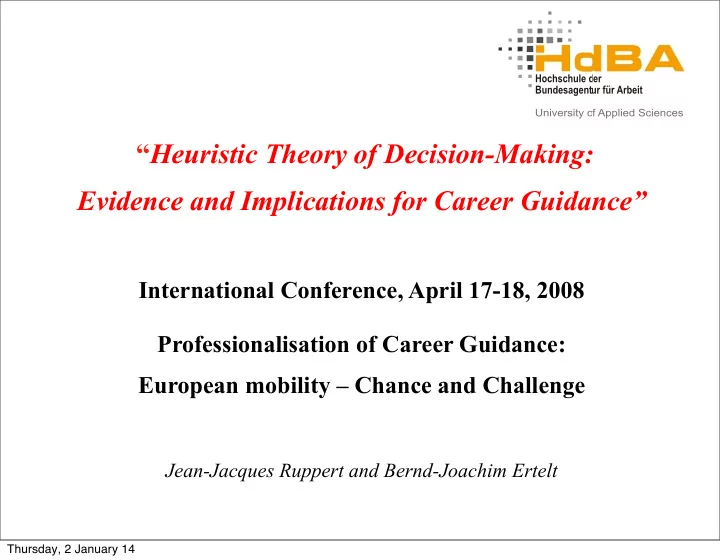

“ Heuristic Theory of Decision-Making: Evidence and Implications for Career Guidance” International Conference, April 17-18, 2008 Professionalisation of Career Guidance: European mobility – Chance and Challenge Jean-Jacques Ruppert and Bernd-Joachim Ertelt Thursday, 2 January 14
“Ideal” Conditions for the Optimisation of Decision-Making - the goals must be well defined, in quantitative terms; - the decision-maker’s values must be stable; - the situation must be stable; - the task is restricted to the selection between options; - the number of alternatives generated must be exhaustive; Thursday, 2 January 14
- the optimal choice can be selected without disproportional time and effort; - the options must be thoroughly compared to each other; - the decision-maker must use a compensatory strategy; - the probability estimates must be coherent and accurate; - the scenarios used to predict failures must be exhaustive and realistic; - the evaluation of each scenario must be exhaustive. G. Klein (2002) Thursday, 2 January 14
“bounded rationality”, “ecological rationality” “fast and frugal heuristics employ a minimum of time, knowledge and computation to make adaptive choices in real environments” G. GIGERENZER, P. TODD and the ABC Research Group, (1999) Thursday, 2 January 14
Search, Stopping and Decision Rules of some HEURISTICS heuristic search rule stopping rule decision rule satisficing random search for search is stopped decision in favour of the first alternatives as soon as an alternative that meets the alternative meets satisficing threshold the satisficing (aspiration level) threshold satisficing is g is basically the same as increme ementalism but the indivi dividual does not just take any incremental step or al step or accept any change from a gi om a given point of departu parture but that step constitutes an i improvement in as far as it « sat « satisfies » a certain need or need or aspiration. Thursday, 2 January 14
Search, Stopping and Decision Rules of some HEURISTICS heuristic search rule stopping rule decision rule incrementalism search for alternatives search is stopped decision in favour of the alternative that deviates only that deviate only a as soon as an a little from the point of little from the point of alternative departure but represents departure represents an nevertheless an improvement improvement on (chosen alternative becomes the point of new point of departure) departure Sarah would like to be ke to become a nurse. As her gr r grades are unfortunatel ately not good enough she decides to train as an ancill ancillary i. e. she uses an increm cremental heuristic as she she chooses the alternative that is closes osest to nursing. Thursday, 2 January 14
Search, Stopping and Decision Rules of some HEURISTICS heuristic search rule stopping rule decision rule minimalist random search for a search is stopped usually decision in favour of relevant criterion that as soon as a the “known” alternative; differentistes between criterion is found otherwise decision in favour alternatives that differentiates of the alternative with the between highest cue validity on the alternatives chosen criterion after a rather len r lengthy procedure primary school chool pupils in Luxembou bourg are ‘guided’ at the age of 12 into a vocation ational or a more academic stream of s am of secondary school. I ool. If on the whole parents follow the recomme ommendations of the guidance boar board, though all too frequ oo frequently very reluctantly, the children usual sually get the choice of which sch school to go to. If John th n then decides to go to the same school as most of h ost of his mates, his decision of ‘doi of ‘doing what his friends do’ ds do’ is a good example of the use of a m of a minimalist heuristic as he does n does not (really) consider an der any other alternatives. Thursday, 2 January 14
Search, Stopping and Decision Rules of some HEURISTICS heuristic search rule stopping rule decision rule take the best “ordered” search for a search is stopped decision in favour of the criterion with the highest as soon as a alternative with the highest decision potential criterion is found cue validity on the chosen that discriminates criterion between alternatives the take the be he best heuristic is similar to the m he minimalist heuristic bu c but there is more information available and t and the search is more ‘ordered’. If S d’. If Sarah decides to study o study at the university where her boyfriend is al d is already a student and if she reac reaches that decision afte after having considered possible alternatives, she , she uses the take the best heuristi ristic as she decides in fav favour of the alternative with the high highest cue validity on the chosen osen criterion i. e. to be wi o be with her boyfriend. Thursday, 2 January 14
Thursday, 2 January 14
« … I invite you to a journey into a land of rationality that is different from the familiar one we know where the sun of enlightenment shines down in beams of logic and probability. The new land of rationality we set out to explore is shrouded in a dim mist of uncertainty, populated with people who have limited time and knowledge, but with smart heuristics at their disposal. Welcome, and I hope you feel at home in this world. » Gerd Gigerenzer (2004 ) Thursday, 2 January 14
Thank you for your attention. prof.ertelt@gmx.net jean-jacques.ruppert@education.lu Thursday, 2 January 14
Recommend
More recommend